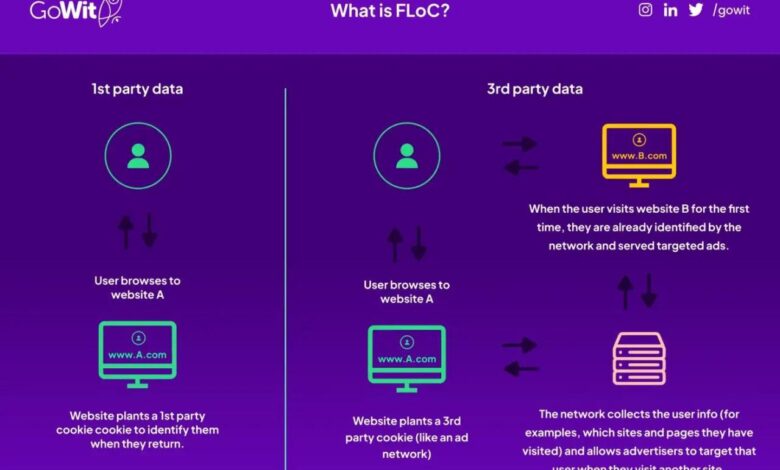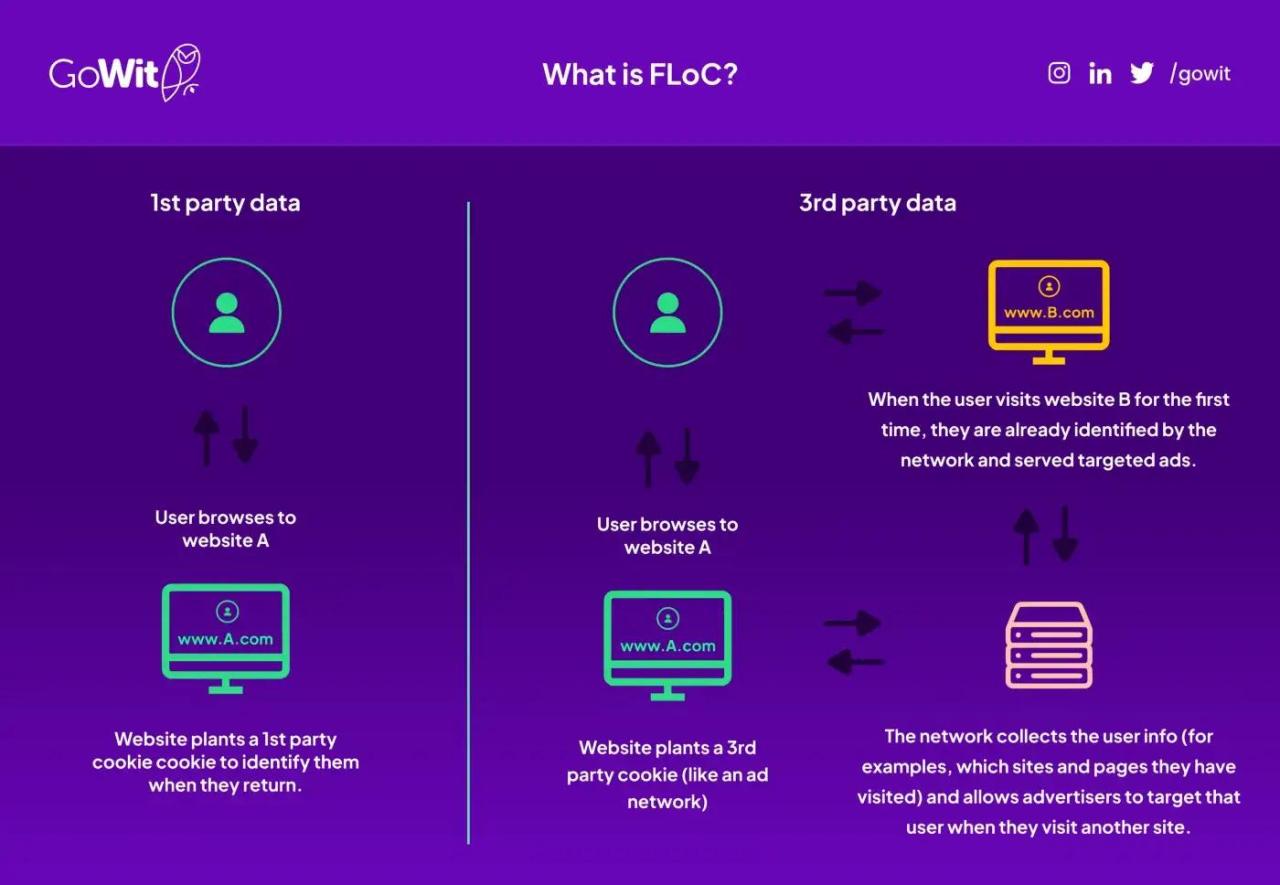
WordPress Fights FLoC Data Privacy at Stake
WordPress joins the fight over data privacy against FLoC, a controversial new method for tracking user behavior online. This move highlights the growing tension between powerful tracking technologies and user privacy rights. The debate has significant implications for WordPress users, the broader web industry, and the future of data collection practices. We’ll explore the technical aspects, potential impacts on WordPress users and its ecosystem, and examine the broader web industry implications.
Understanding this crucial issue is key for anyone who uses or develops on WordPress.
The fundamental principles of FLoC, a privacy model that groups users into cohorts based on their browsing history, are at the heart of this debate. WordPress’s opposition stems from concerns about user privacy and the potential for misuse of personal data. This article delves into the history of the FLoC controversy, comparing it to alternative privacy-preserving methods and examining WordPress’s technical response.
Background of the FLoC and WordPress Involvement
The digital landscape is increasingly complex, and the collection and use of user data are at the forefront of many discussions. Federated Learning of Cohorts (FLoC) is one such approach, raising concerns about user privacy and control over personal information. WordPress, a prominent player in the web publishing sphere, has taken a stance against FLoC, highlighting the importance of user data protection.FLoC aims to create user cohorts based on browsing behavior, enabling targeted advertising without directly tracking individual users.
However, critics argue that this method still compromises user privacy, as the inferred user profiles can still be used for targeted advertising. This raises questions about the balance between personalized experiences and user privacy rights.
Fundamental Principles of FLoC
FLoC utilizes a decentralized approach to build user profiles. Instead of individual browsers collecting and sharing data, multiple browsers contribute to the creation of broad user groups, or cohorts. These cohorts are identified based on browsing patterns, but not tied to specific individuals. The core idea is to enable targeted advertising without directly tracking individuals, aiming to offer a more privacy-respectful alternative to traditional tracking methods.
However, concerns remain about the potential for data leakage and the accuracy of cohort assignments.
Rationale Behind WordPress’s Opposition to FLoC
WordPress’s opposition to FLoC stems from a commitment to user privacy and control over personal data. The platform recognizes that while FLoC attempts to address privacy concerns, it still leaves room for potential misuse and lacks transparency regarding the use of inferred data. Concerns about the potential for unintended consequences and the lack of user control over their data contribute to the platform’s opposition.
This position aligns with a broader movement toward stronger data protection measures.
Timeline of Key Events and WordPress’s Stance
A precise timeline of events surrounding the FLoC debate and WordPress’s involvement is not readily available in a centralized source. However, the debate likely unfolded alongside discussions within the broader tech community about data privacy regulations and alternatives to traditional tracking methods. WordPress’s stance likely evolved as the debate progressed, reflecting its commitment to user data protection. This continuous monitoring of the issue ensures a proactive response to evolving privacy concerns.
WordPress joining the fight against FLOC’s data collection practices is a smart move. It highlights the importance of user privacy in today’s digital landscape. Thinking about scaling your business online? Check out how you can scale your business online in under one minute and see how these privacy concerns impact your online presence. Ultimately, prioritizing user privacy will be key for long-term success in the digital age, just like WordPress is demonstrating.
Comparison of FLoC with Alternative Approaches
Various privacy-preserving technologies exist as alternatives to FLoC. These include privacy-enhancing technologies (PETs) such as differential privacy, federated learning, and homomorphic encryption. These methods aim to achieve similar goals to FLoC, but with greater emphasis on user privacy and data security. The table below illustrates a comparison of FLoC with some prominent alternatives.
| Feature | FLoC | Differential Privacy | Federated Learning |
|---|---|---|---|
| Data Collection Method | Decentralized, browser-based | Adds noise to data | Data remains on devices |
| Privacy Preservation | Cohort-based, less direct tracking | Hinders precise data retrieval | Prevents central data collection |
| Transparency | Limited transparency | High transparency | High transparency |
| Control over Data | Limited user control | High user control | High user control |
Potential Motivations for WordPress’s Involvement
WordPress’s participation in this data privacy controversy likely stems from its commitment to its user base. By opposing FLoC, WordPress demonstrates its commitment to safeguarding user data and upholding its reputation for providing a safe and secure platform. The platform likely anticipates future regulations and aims to be compliant with emerging privacy standards. This commitment reflects the growing recognition of the importance of user privacy.
Impact on WordPress Users and Ecosystem

The FLoC (Federated Learning of Cohorts) debate has significant implications for WordPress users and the wider ecosystem. WordPress, as a platform heavily reliant on user-generated content and advertising revenue, is directly affected by the shift in digital advertising landscapes. Understanding the potential consequences of FLoC’s implementation is crucial for both users and developers alike.The FLoC proposal, intended to provide a more privacy-respectful alternative to third-party cookies, introduces a novel approach to user profiling.
This method could impact how WordPress functions and interacts with its users, requiring adaptation and adjustment in various aspects of the platform.
Potential Effects on User Privacy
The implementation of FLoC raises concerns about the level of user privacy protection offered by WordPress. While FLoC aims to mitigate the intrusive nature of third-party cookies, the method of cohort-based advertising still collects and aggregates user data. This means users’ browsing habits could be inferred and used to create user profiles, impacting their online experience and potentially exposing them to targeted advertising.
Consequences for WordPress Plugins and Themes
WordPress plugins and themes heavily rely on advertising APIs and analytics tools. The FLoC debate could force developers to adjust their codebases to align with the new privacy standards. Plugins that utilize third-party cookies for targeted advertising might face limitations or require complete re-engineering to utilize FLoC. This could lead to a significant cost in development time and resources for developers.
Impacts on WordPress Advertising Revenue and Monetization Strategies
The potential shift away from third-party cookies could dramatically impact WordPress’s advertising revenue streams. Many plugins and themes rely on advertising revenue for their functionality or to support the development and maintenance of their products. If advertising revenue diminishes, the monetization strategies of these plugins and themes could be affected. This could lead to increased costs for users or potentially even reduced availability of certain plugins and themes.
Examples from other platforms illustrate how a change in advertising methods can cause a significant drop in revenue for publishers.
Potential Changes in the WordPress Community’s Approach to Privacy Concerns
The FLoC debate is likely to encourage a stronger focus on user privacy within the WordPress community. Developers might prioritize building privacy-respecting features into their plugins and themes. Users might become more discerning about the plugins and themes they install, seeking those that prioritize user data protection. This could lead to a more robust and privacy-conscious WordPress ecosystem.
WordPress’s move to combat the FLoC (Federated Learning of Cohorts) privacy issue is a smart move, but ultimately, optimizing your website for profitability is key. Think about how Amazon’s A10 algorithm, detailed in amazons a10 algorithm what it is and how you can use it to increase profitability , can help you improve your site’s performance. This, in turn, will make your site more resilient and better equipped to handle evolving privacy concerns like FLoC, which can impact user experience.
Ultimately, a well-optimized site benefits everyone involved.
Potential User Scenarios Affected by the FLoC Debate
| Scenario | User Impact | Plugin/Theme Impact |
|---|---|---|
| User A: Heavily relies on ad-supported plugins for website functionality. | Potential reduction in functionality or increased costs for plugin usage. | Plugin developers need to adapt their monetization strategies to remain viable. |
| User B: Uses a theme that heavily depends on third-party ad networks. | Potential decrease in ad revenue and display quality. | Theme developers must explore alternative monetization strategies and adapt to FLoC. |
| User C: Actively seeks privacy-respecting plugins and themes. | Increased choice and better control over their data. | Developers focusing on privacy gain a competitive advantage. |
Technical Aspects of WordPress’s Opposition
WordPress, a powerful and widely used content management system, faces a critical juncture regarding data privacy and advertising. Its open-source nature and vast community make it a focal point for this debate. The fight against FLoC (Federated Learning of Cohorts) is not just a matter of principle; it’s a crucial technical challenge that affects the platform’s architecture, user experience, and long-term sustainability.The core of WordPress’s technical structure revolves around its modular architecture and extensive plugin ecosystem.
This flexibility, while a strength, presents unique challenges in controlling data flows and ensuring privacy-respecting practices. Addressing FLoC’s impact necessitates a careful consideration of existing technical implementations, while exploring alternative strategies that prioritize user data security.
WordPress’s Data Handling and Advertising
WordPress’s advertising system, often integrated through plugins, typically leverages third-party services for display and tracking. This integration can lead to data collection practices that are less transparent and less controlled by WordPress itself. A detailed analysis of these integrations is crucial to understand the potential impact of FLoC and to explore alternative, privacy-centric solutions.
Technical Implications of FLoC on WordPress
FLoC’s reliance on browser fingerprinting and cohort grouping directly impacts WordPress’s existing advertising infrastructure. The platform’s ability to tailor advertising to specific user groups is significantly affected. Furthermore, the potential for increased data collection and tracking raises concerns about user privacy and the platform’s overall security.
Technical Feasibility of Alternatives to FLoC
Several alternative approaches to data collection and user targeting are technically feasible within the WordPress ecosystem. These include:
- Contextual Advertising: Focusing on content relevance rather than broad user profiling. WordPress plugins and themes could be adapted to support this approach, prioritizing ads that align with the content being displayed. This approach is demonstrably less intrusive and focuses on providing relevant advertising experiences, which can enhance user engagement.
- Privacy-Preserving Analytics: Utilizing tools and techniques that anonymize user data or provide aggregated insights without compromising individual user privacy. Such solutions are emerging and offer an alternative to broad-stroke profiling that FLoC represents. This is especially important in maintaining user trust and demonstrating a commitment to data privacy.
- Open-Source, Privacy-Focused Ad Platforms: Developing and adopting alternative ad platforms built on open-source principles and privacy-enhancing technologies. This approach empowers WordPress and its users with more control over the data collection and usage process. The creation of such platforms fosters innovation and competition in the ad tech sector, encouraging the development of solutions that prioritize privacy.
Comparison of Technical Approaches
A crucial aspect of this discussion involves a comparative analysis of the technical approaches to data collection and privacy. The following table provides a structured overview:
| Approach | Data Collection Method | Privacy Impact | Technical Complexity |
|---|---|---|---|
| FLoC | Browser fingerprinting, cohort grouping | High risk of profiling, potential for misuse | Relatively low |
| Contextual Advertising | Content relevance | Lower risk of profiling, increased user engagement | Moderate |
| Privacy-Preserving Analytics | Aggregated data, anonymization | High level of privacy protection | High |
| Open-Source Ad Platforms | Decentralized, controlled by community | High level of privacy control | High |
The table highlights the trade-offs between different approaches. While FLoC offers simplicity in implementation, it comes at the cost of user privacy. Alternative approaches, while more complex, offer a more privacy-centric solution that aligns with WordPress’s commitment to its users.
Potential Implications for the Web Industry
WordPress’s vocal opposition to the proposed Federated Learning of Cohorts (FLoC) system signals a significant shift in the web industry’s approach to user data privacy. This stance, taken by a platform used by millions of websites, carries weight and could trigger a domino effect across the digital landscape. The implications for user trust, data security, and the future of advertising models are profound and far-reaching.The debate over FLoC highlights a growing awareness among users about the collection and use of their personal data.
WordPress’s proactive engagement in this debate positions it as a champion of user privacy, potentially influencing the choices of other website platforms. This action has the potential to reshape the entire digital ecosystem and challenge the status quo in the advertising industry.
Broader Implications for Website Platforms
WordPress’s decision to oppose FLoC has significant ramifications for other website platforms. The platform’s substantial user base and influence could inspire similar resistance from other content management systems (CMS) and website builders. This collective action could pressure advertising platforms to adopt more transparent and user-friendly data collection practices. This could lead to a more decentralized and user-centric approach to online advertising.
Impact on User Trust and Data Security
WordPress’s stance directly impacts user trust and data security across the internet. By publicly opposing FLoC, WordPress signals its commitment to protecting user data, which could foster greater user trust in the platform and its ecosystem. This action could also encourage other platforms to adopt more stringent data privacy measures. This increased awareness and accountability could lead to a more secure digital environment for all internet users.
WordPress’s stance against Google’s FLoC is definitely a step in the right direction for data privacy. However, it’s important to remember that inadvertently blocking your site’s pages from Google’s crawlers using the noindex tag can lead to serious ecommerce issues. For example, google how the noindex tag can cause issues in ecommerce explores how this can impact search visibility and ultimately hurt sales.
Ultimately, WordPress’s fight against FLoC is crucial for a more privacy-respecting digital environment.
Comparison with Other Major Platforms
WordPress’s actions can be compared to the approaches of other major platforms. While some platforms may have already taken a similar stance against FLoC, WordPress’s visibility and extensive user base elevate the significance of its opposition. This could serve as a catalyst for a wider discussion and potential industry-wide shift in data privacy policies. For instance, comparing WordPress’s approach with that of Facebook, which initially supported FLoC, underscores the diverging perspectives on user data management.
Long-Term Consequences of the FLoC Debate
The FLoC debate’s long-term consequences will likely shape the future of online advertising and user data handling. The debate’s outcome could lead to alternative privacy-respecting advertising models or the development of more user-centric data management strategies. This evolution could fundamentally alter how businesses operate online and how users interact with the digital world. The future of the internet, including the types of targeted ads seen, will be impacted by this debate.
Potential Impacts on Different Segments of the Web Industry
| Segment | Potential Impact |
|---|---|
| Website Owners | Increased pressure to prioritize user privacy, potential shift towards alternative advertising models, or more transparent data handling practices. |
| Advertising Platforms | Increased pressure to adopt more user-friendly and transparent data collection methods, potential development of alternative, privacy-respecting advertising models. |
| Users | Increased control over their personal data, potentially greater transparency and control over how their data is used, increased trust in platforms prioritizing their privacy. |
| Developers | Increased demand for privacy-focused tools and technologies, potential need to adapt existing solutions to respect user data. |
Future of Data Privacy and WordPress
The fight against FLoC highlights a crucial turning point in the digital landscape. Data privacy is no longer a niche concern but a fundamental element of user trust and platform sustainability. As regulations evolve and user expectations rise, WordPress must adapt to ensure its continued relevance and value. The future of WordPress is inextricably linked to its commitment to safeguarding user data.The potential for future data privacy regulations is significant and complex.
Governments worldwide are actively considering stricter measures, likely incorporating more granular controls over data collection and usage. Expect to see regulations demanding explicit consent for specific data types and stricter penalties for violations. This could include mandatory data minimization policies, enhanced user transparency, and increased control over data sharing and transfer. These trends will push platforms like WordPress to re-evaluate their data handling practices.
Potential Future Developments in Data Privacy Regulations, WordPress joins the fight over data privacy against floc
Data privacy regulations are likely to become more stringent. Anticipated developments include mandatory data minimization policies, which would limit data collection to only what is strictly necessary for the intended purpose. Increased user transparency is another possibility, requiring platforms to be explicit about the data they collect, how it’s used, and who it’s shared with. Enhanced user control over data sharing and transfer will give users more say in how their data is handled and moved.
The EU’s General Data Protection Regulation (GDPR) and California Consumer Privacy Act (CCPA) serve as early examples of this trend.
Possible Responses from Other Web Platforms to FLoC’s Potential Demise
The demise of FLoC will likely prompt other web platforms to explore alternative methods for targeted advertising. Some platforms may shift towards more transparent and user-controlled methods of data collection, aligning with user expectations and evolving regulations. Others may adopt more nuanced approaches to user segmentation, prioritizing data privacy while maintaining effective advertising strategies. The shift away from cookie-based tracking may lead to greater emphasis on consent-based data collection and the development of privacy-enhancing technologies.
Potential for WordPress to Lead the Way in Data Privacy
WordPress has the opportunity to lead the way in data privacy by fostering a culture of respect for user data. This involves promoting best practices in data handling, educating developers and users about privacy implications, and proactively addressing emerging privacy concerns. WordPress can also encourage the adoption of privacy-enhancing technologies, empowering users with greater control over their data.
By actively shaping the future of data privacy, WordPress can strengthen its position as a trusted platform.
Emerging Technologies Influencing WordPress’s Approach to Data Privacy
Several emerging technologies could influence WordPress’s approach to data privacy. Federated learning, which allows machine learning models to be trained across multiple devices without sharing sensitive data, is one example. Differential privacy, which adds noise to data to protect individual identities, is another promising technology. These advancements could enable more personalized experiences while maintaining user privacy. The open-source nature of WordPress could accelerate the adoption and integration of these technologies.
Potential Collaborations Between WordPress and Other Organizations in the Privacy Space
Collaboration with organizations focused on data privacy and security is crucial. Partnerships with privacy advocacy groups could help WordPress stay informed about evolving regulations and user expectations. Collaborations with researchers developing privacy-enhancing technologies can allow WordPress to incorporate cutting-edge solutions into its platform. Such collaborations would foster a shared understanding of data privacy challenges and potential solutions.
Potential Scenarios for the Future of WordPress and Data Privacy
| Scenario | Description | Impact on WordPress |
|---|---|---|
| Stronger Regulations | Stricter data privacy regulations emerge globally. | WordPress needs to adapt its data handling practices to comply with the new regulations. Increased focus on user control and transparency will be essential. |
| User-Centric Approach | Users demand greater control over their data. | WordPress must empower users with greater control over their data, fostering trust and engagement. Increased transparency and choice are key. |
| Privacy-Focused Innovation | New technologies and practices prioritize data privacy. | WordPress can leverage these technologies to offer more personalized experiences while maintaining user privacy. |
Alternative Data Collection Methods: WordPress Joins The Fight Over Data Privacy Against Floc

The fight for user data privacy is a crucial one, and the flawed FLoC approach has exposed the urgent need for alternative methods. These methods must prioritize user autonomy and respect their choices, while still allowing for valuable insights and targeted advertising. This exploration delves into various alternative approaches, analyzing their strengths and weaknesses in comparison to FLoC and considering their potential integration into the WordPress ecosystem.Alternative data collection methods are essential to maintaining user trust and privacy.
Traditional methods often involve invasive tracking, leading to user concerns about privacy violations. By exploring alternative models, we can ensure data collection is both effective and respectful of user autonomy.
Federated Learning of Cohorts
Federated learning of cohorts (FLoC alternatives) aggregates user data from multiple websites within a specific cohort. This method can provide advertisers with insights into user preferences without directly identifying individual users. Instead of tracking individual browsing habits across numerous sites, this approach groups users with similar browsing patterns, enabling a generalized understanding of user interests.
Privacy-Preserving Advertising Technologies
Privacy-preserving advertising technologies aim to enable targeted advertising while maintaining user privacy. These methods often rely on techniques like differential privacy or homomorphic encryption, which obfuscate individual user data while allowing for the analysis of aggregate trends. These technologies aim to achieve the same targeted advertising outcomes as FLoC but with a much stronger emphasis on user privacy.
Contextual Advertising
Contextual advertising focuses on displaying ads based on the content of the webpage a user is viewing. This method relies on analyzing the content and topic of a webpage to show relevant ads. This approach generally respects user privacy, as it avoids tracking individual browsing behavior.
User-Provided Data and Preferences
User-provided data and preferences represent a more direct and transparent approach to data collection. Users actively choose to share their interests, preferences, and demographic information with websites. This approach empowers users to control their data, as they decide which information to share and with which websites.
Comparison Table of Alternative Data Collection Methods
| Method | Effectiveness | Efficiency | Privacy Impact | WordPress Integration Potential |
|---|---|---|---|---|
| Federated Learning of Cohorts | High, providing aggregate insights | High, scalable for large datasets | Medium, users within cohorts may be identifiable | Potentially through partnerships with privacy-preserving platforms |
| Privacy-Preserving Advertising Technologies | High, enabling targeted advertising | Medium, potentially complex implementations | High, effectively masking individual user data | Through plugins or integration with existing ad networks |
| Contextual Advertising | Medium, effectiveness depends on content relevance | High, relatively straightforward to implement | High, no direct tracking of user behavior | Direct integration with WordPress themes or plugins |
| User-Provided Data and Preferences | High, based on user choices | Low, requires active user engagement | High, users control their data | Through customizable profiles and preferences |
Ending Remarks
WordPress’s stance against FLoC signals a growing awareness of the importance of data privacy in the digital age. This controversy forces us to confront the trade-offs between user experience, targeted advertising, and robust privacy protections. The potential implications for the web industry are far-reaching, and the choices made now will shape the future of data collection and user trust.
WordPress’s commitment to its users’ privacy is commendable, and this move could inspire other platforms to adopt similar safeguards.




